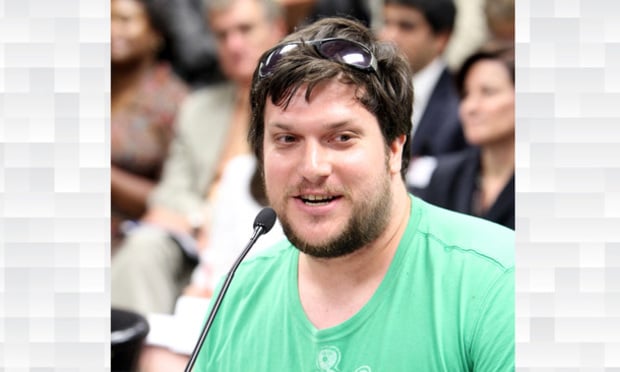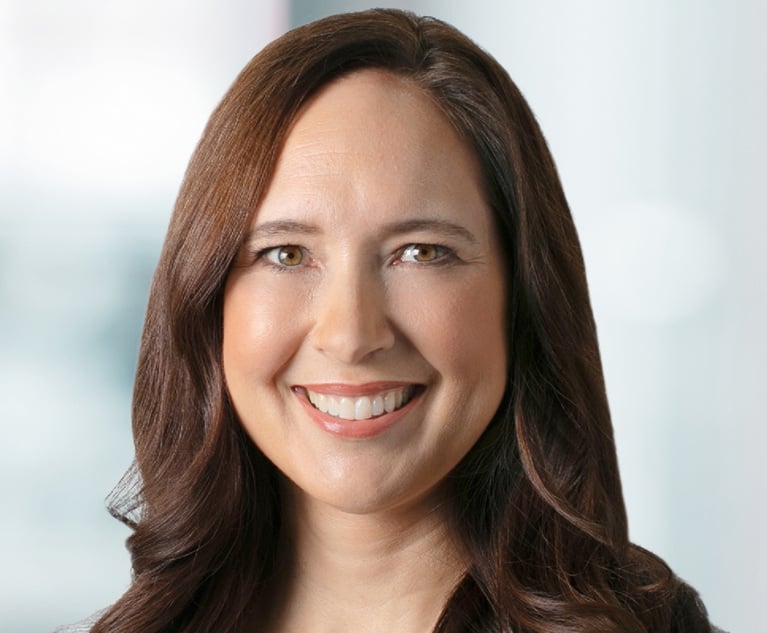Law Student With Housing Advocacy Chops Battles Lease-to-Own Company Over Home Repairs
Matthew Cardinale has filed an Anti-SLAPP motion against Divvy Homes, which has sought to rescind his lease-to-own contract over what it claims are his unreasonably extensive repair demands.
May 02, 2018 at 05:30 PM
5 minute read

A real estate company that offers lease-to-own homes has asked a judge to let it out of contract with a local law student whose resume includes arguing and winning a pro se suit against the city of Atlanta at the Georgia Supreme Court.
In a suit filed last month, San Francisco-based Divvy Homes claims it was misled by Matthew Cardinale, a housing advocate and publisher of online news webpage Atlanta Progressive News, who asked Divvy to makes multiple repairs to the northwest Atlanta house he bought in February.
Cardinale, the company said “appears to have entered into the lease agreement for purposes of his own agenda and not in a good faith effort to pursue home ownership” with Divvy.
“Cardinale, a law student, has had extensive experience with housing regulations, is a proclaimed housing advocate and has appeared regularly before the Atlanta City Council's [community development and human services] committee,” according to the petition.
Not so, said Cardinale, who says he loves his Hunter Hills house but expects his landlord, Divvy, to make necessary repairs to bring it up to code.
“They said I basically fraudulently conspired, using my superior knowledge of the law, to make it seem like I would make the repairs then shift the burden to them,” Cardinale said.
He said that, while Divvy did make some repairs, remaining issues include electrical switches, windows that won't open, water damage, a leaky roof and structural damage.
Troutman Sanders partner William Droze filed the petition for declaratory relief April 4, but both sides have already exchanged multiple motions and filings, including an Anti-SLAPP motion aimed at Divvy's argument the contract should be rescinded because he's a housing advocate.
“It's not illegal to be a housing advocate,” he said. “The idea that I, a third-year law student, somehow took advantage of them is also kind of silly.”
Cardinale was awarded a full legal scholarship to Gonzaga University School of Law after persuading the Georgia Supreme Court that Atlanta officials violated the state Open Meetings Act, and finished up his final course at Emory University Law School just last week.
He also faced down the American Legislative Exchange Council in 2016, when its lawyers sent him a cease-and-desist letter demanding he take down a website for his affordable housing organization, SmartALEC.
Cardinale ignored it, and ALEC never followed through on its threats.
Droze was unavailable for comment on Wednesday, and Divvy president Brian Ma said he would refer questions to another lawyer representing the company. There was no further response by press time.
According to Divvy's petition, the lease agreement states the premises “are in good and satisfactory order” and accepted “as-is.”
It said Cardinale “began making repair requests to Divvy Homes and sought to prorate the February rent” as soon as he moved in.
Despite the lease agreement, Divvy made a “good faith effort” to respond, spending more than $12,000 on repairs “in an effort to satisfy Cardinale with the property.”
Divvy argued that neither party realized the extent of damage the house had when it was inspected and said the contract should be rescinded because “the parties were laboring under a mutual mistake” when the lease was signed.
It said Cardinale had reported via social media that he was preparing to sue Divvy and had “breached the covenant of good faith and fair dealing” under Georgia contract law.
Cardinale responded with his own counterclaims for damages he incurred, including damages for clothing ruined by a sewage leak and stays at a hotel while the house was uninhabitable.
His anti-SLAPP motion confirmed that Cardinale testified at a City Council committee meeting on March 27 about his experience with Divvy, and posted about Divvy on Facebook and YouTube.
“Addressing the Atlanta City Council and communicating with elected officials regarding one's experiences as a residential tenant are protected First Amendment activities,” Cardinale wrote.
Divvy, Cardinale wrote, is arguing he “should be deprived of his very home because he chose to make statements on Facebook that [Divvy] did not like,” and because he “petitioned the legislative and executive branches of the city of Atlanta.”
On Wednesday, Cardinale said he was busy crafting a further response to Divvy's “mutual mistake” claim and that Georgia's landlord-tenant law clearly required Divvy to make necessary repairs even if both parties were unaware of them when the lease was signed.
Cardinale said he expected the court to strike many of Divvy's claims and laughed at the argument that it should be able to back out the lease because he is a housing advocate.
“I guess we housing advocates are going have to build a tent city under a bridge so we'll have a place to live,” he said.
This content has been archived. It is available through our partners, LexisNexis® and Bloomberg Law.
To view this content, please continue to their sites.
Not a Lexis Subscriber?
Subscribe Now
Not a Bloomberg Law Subscriber?
Subscribe Now
NOT FOR REPRINT
© 2025 ALM Global, LLC, All Rights Reserved. Request academic re-use from www.copyright.com. All other uses, submit a request to [email protected]. For more information visit Asset & Logo Licensing.
You Might Like
View All
A Plan Is Brewing to Limit Big-Dollar Suits in Georgia—and Lawyers Have Mixed Feelings
10 minute read
On The Move: Kilpatrick Adds West Coast IP Pro, Partners In Six Cities Join Nelson Mullins, Freeman Mathis
6 minute read

Did Ahmaud Arbery's Killers Get Help From Glynn County DA? Jury Hears Clashing Accounts
Trending Stories
- 1Law Firms Expand Scope of Immigration Expertise, Amid Blitz of Trump Orders
- 2Latest Boutique Combination in Florida Continues Am Law 200 Merger Activity
- 3Sarno da Costa D’Aniello Maceri LLC Announces Addition of New Office in Eatontown, NJ, and Named Partner
- 4Friday Newspaper
- 5Public Notices/Calendars
Who Got The Work
J. Brugh Lower of Gibbons has entered an appearance for industrial equipment supplier Devco Corporation in a pending trademark infringement lawsuit. The suit, accusing the defendant of selling knock-off Graco products, was filed Dec. 18 in New Jersey District Court by Rivkin Radler on behalf of Graco Inc. and Graco Minnesota. The case, assigned to U.S. District Judge Zahid N. Quraishi, is 3:24-cv-11294, Graco Inc. et al v. Devco Corporation.
Who Got The Work
Rebecca Maller-Stein and Kent A. Yalowitz of Arnold & Porter Kaye Scholer have entered their appearances for Hanaco Venture Capital and its executives, Lior Prosor and David Frankel, in a pending securities lawsuit. The action, filed on Dec. 24 in New York Southern District Court by Zell, Aron & Co. on behalf of Goldeneye Advisors, accuses the defendants of negligently and fraudulently managing the plaintiff's $1 million investment. The case, assigned to U.S. District Judge Vernon S. Broderick, is 1:24-cv-09918, Goldeneye Advisors, LLC v. Hanaco Venture Capital, Ltd. et al.
Who Got The Work
Attorneys from A&O Shearman has stepped in as defense counsel for Toronto-Dominion Bank and other defendants in a pending securities class action. The suit, filed Dec. 11 in New York Southern District Court by Bleichmar Fonti & Auld, accuses the defendants of concealing the bank's 'pervasive' deficiencies in regards to its compliance with the Bank Secrecy Act and the quality of its anti-money laundering controls. The case, assigned to U.S. District Judge Arun Subramanian, is 1:24-cv-09445, Gonzalez v. The Toronto-Dominion Bank et al.
Who Got The Work
Crown Castle International, a Pennsylvania company providing shared communications infrastructure, has turned to Luke D. Wolf of Gordon Rees Scully Mansukhani to fend off a pending breach-of-contract lawsuit. The court action, filed Nov. 25 in Michigan Eastern District Court by Hooper Hathaway PC on behalf of The Town Residences LLC, accuses Crown Castle of failing to transfer approximately $30,000 in utility payments from T-Mobile in breach of a roof-top lease and assignment agreement. The case, assigned to U.S. District Judge Susan K. Declercq, is 2:24-cv-13131, The Town Residences LLC v. T-Mobile US, Inc. et al.
Who Got The Work
Wilfred P. Coronato and Daniel M. Schwartz of McCarter & English have stepped in as defense counsel to Electrolux Home Products Inc. in a pending product liability lawsuit. The court action, filed Nov. 26 in New York Eastern District Court by Poulos Lopiccolo PC and Nagel Rice LLP on behalf of David Stern, alleges that the defendant's refrigerators’ drawers and shelving repeatedly break and fall apart within months after purchase. The case, assigned to U.S. District Judge Joan M. Azrack, is 2:24-cv-08204, Stern v. Electrolux Home Products, Inc.
Featured Firms
Law Offices of Gary Martin Hays & Associates, P.C.
(470) 294-1674
Law Offices of Mark E. Salomone
(857) 444-6468
Smith & Hassler
(713) 739-1250






